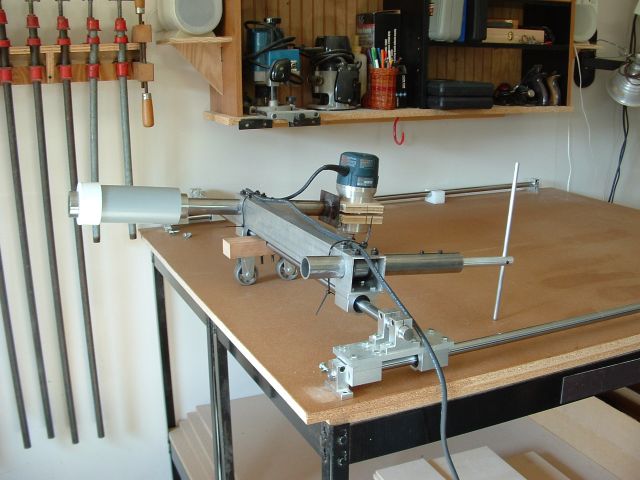Wood Duplicator Project
In the development of my Luthier shop I felt it important to have a wood duplicator. The ability to develop instruments with an arched top or other raised and or contoured profiles is facilitated by having a machine to duplicate a master pattern. A duplicator could also preform functions that an overhead router, or a router using a template would preform ie: routing pickup cavities or an electronics cavity.
I started investigating buying a machine and the cost was a bit more then my budget would allow. E-bay is always for me a good starting point to search for tools and the cheapest available duplicator that I found listed on E-bay was from a vendor by the name of "leedavison" who builds a pretty solid duplicator in a variety of sizes. His machine for guitar construction was $1,185.00 and did not include the rails wich I estimate would add approx another 150.00 dollars. The other readily available machine is the Gemini Wood Carver (www.wood-carver.com) and at 3,150 dollars that was out of my range but it is probably the best designed machine. Popular among carving enthuasists is the Copy Carver which is a DIY machine that is functional but something about it seemed a bit crude but I can't say it would not have been a functional workable machine at a lesser cost.
I decided to build a machine myself drawing from designs I found on web searches. CNC machines are becomming really popular and I'm sure the wave of the future but probably more costly to build and a bit of a learning curve to learn to operate. The CNC machines share a common function with a wood duplicator in the ability to move on an x,y,z axis and as such I borrowed some design inspiration from them as well. VXB is an online supplier of linear bearings, shafts, shaft supports and is probably the best and cheapest source for building the needed linear motion components of a duplicator. Speedy Metals is a supplier on line of small quanity metals in a variety of types and that is where I recommend buying the needed metals to fabricate the structural components. Speedy metals will cut metal to the desired lenght and offers a good range of materials. The other needed essential tools are a drill press with a low speed of approximately 230 rpm and a tap and dye set. You will need also the ability to weld or you will have to go to a shop to have fabricated the one part that requires a weld joint. My goal was to have as little outside work done to help keep the cost down.
The design I developed uses 20mm shaft and bearings 55inches long for the y axis and 49 inch wide for the z axis. The z axis supports the router (Bosch 1617evs) and stylus with the bearing shaft assembly bolted to a 2-1/2 inch aluminum square tube 24 inches long. Drilled through the aluminum square tube is a 1-1/2 inch diameter hole centered 1 1/2 from either end through which passes a 1-1/2 inch steel round tube DOM type with a wall thickness of .120. One round tube is 24 inches long and the other is 12 inches long. Welded to the end of the 24 inch round tube is a steel plate 3 inches by 4 inches. The router mounts to the steel plate using a home made bracket assembly and at the other end of the 24 inch shaft is a counter weight made using schedule 80 pvc pipe (see pictures).
The cost including a 60 by 48 inch table will vary a bit with your own situation and choices but I will estimate it will run approx. 700 to 800 dollars to build vs buying one in the range mentioned above. My design is similar to the ones I found on the net with the exception that several of the home built machines viewed on the web used wood in place of metal which I think is probably OK-- it was just my preference to use metal as I thought it may have a slight advantage in stability and accuracy. Also my design uses a carriage to support the z shaft mid point as the 20mm shaft has a slight deflection which is eliminated with my carriage design (see picture). The lenght of the y axis shaft also has a different shaft support which can be moved along the length to support and eliminate any shaft deflection. Pictured below is the duplicator near completion. I will build a duplicator for you for 1000.00 $ plus shipping or for a modest fee of 25 dollars I will provide a detailed set of instructions and list of materials and source where they can be obtained

The 1-1/2 inch DOM tubes are secured in place with U-bolts and permit adjustment of the shaft lenght. Inside the PVC pipe are lenghts of 3/4 inch drill shaft to add the needed weight to counter balance the weight of the router. I will post updated pictures in the near future.
My goal is to build EUBs (electric upright bass) and the design I'm interested in building has an arched top -- I also believe that I will be able to fabricate the fingerboad and neck using this machine from a master form.